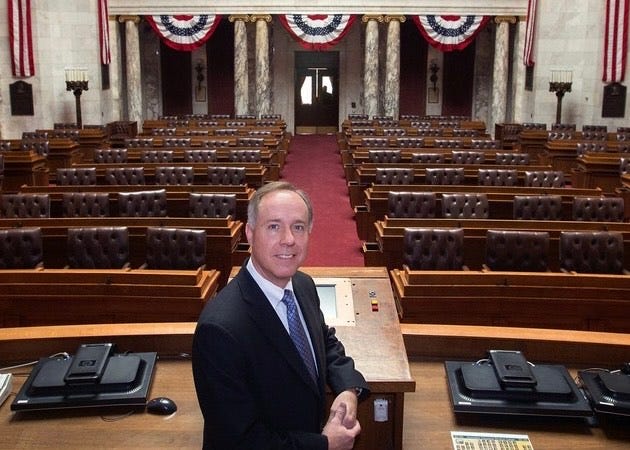Marquette Poll Breakdown: Voters Disapprove of Robin Vos and the Wisconsin Legislature
Plus: Alex Lasry is on the rise in the Democratic primary for U.S. Senate, why Republicans are beholden to election truthers, immigration, education and more.
The Recombobulation Area is a six-time Milwaukee Press Club award-winning weekly opinion column and online publication written and published by veteran Milwaukee journalist Dan Shafer. Learn more about it here.

The Marquette University Law School Poll is the state’s gold standard of measuring where voters stand, so here at The Recombobulation Area, we take a close look at each new poll. Find the full results of the poll here.
It’s time for another trip through the Marquette University Law School Poll. With spring elections and the legislative session now in the state’s rear view mirror, the political spotlight is shifting to the midterms and the big issues impacting them. As always, there’s much to learn from these results. Let’s dive in.
1. Robin Vos is deeply unpopular
The longest serving Assembly Speaker in Wisconsin’s history is not well liked. Robin Vos’ favorability rating in this new poll is at just 12%. Twelve percent! That’s really bad.
His favorability was polled earlier this year and he landed at 13%, so this new number is no outlier. Granted, about 50% of voters said they “haven’t heard enough” about Vos to say whether they have a favorable or unfavorable view of him. But, at just 12% favorable and 29% unfavorable, that net minus-17 favorability rating is worse than any other state politician polled (and it’s not close).
There are a few areas where Vos polls even worse than that dismal topline number. He has just a 7% favorability rating with women (27% unfavorable). Just 8% among independents (30% unfavorable). Just 10% with moderates (31% unfavorable). He’s at just 9% favorable with voters at income levels under $74,000. He’s below 10% in the “rest of state” and Green Bay/Appleton media markets.
While Vos has been dealing with some backlash among the right-wing fringe of election deniers within his party, that’s not where he’s seeing his worst numbers in this poll. The “very conservative” ideological group is where he’s viewed most positively – 26% favorable, 19% unfavorable.
The legislature Vos leads, too, is also not well liked, with a particularly bad approval rating. Just 38% approve of the job the Republican-controlled state legislature is doing, with 47% disapproving. And of that, only 6% strongly approve of the legislature, while 27% strongly disapprove. The net approval rating with independents is minus-21. With moderates, minus-16.
Robin Vos is a deeply unpopular politician who is leading a state legislature that a miniscule number of voters strongly support. The people of Wisconsin can see it for what it is: He’s doing a terrible job.
2. Alex Lasry is on the rise
In February, we cautioned that it was way too soon to take too much away from the results of the Democratic primary poll, that we needed to see more information before making any meaningful analysis (always with the hot takes around here, we know).
But now we have a little more information. And the big takeaway from this poll on the primary is that Alex Lasry is doing really well right now.
We’re less than four months until the Aug. 9 primary. Mandela Barnes came out strong as the frontrunner, but he was never going to be the runaway favorite in this race. He was always going to face a real challenge. Last fall, we thought it would be Sarah Godlewski who emerged from the pack to compete with Barnes. Now, it’s looking like it’ll be Lasry.
So, where is Lasry’s support coming from? He’s the leading candidate with men and with voters over 60 years old. He has a slight edge with voters with income levels under $40,000, and with those who are liberal (but not “very liberal”).
Lasry’s favorability ratings are also fairly strong. He’s at a net plus-5 (16% favorable, 11% unfavorable) overall, and is net plus-7 with independents. He’s very well-liked among Democrats – 24% favorable to just 5% unfavorable. His path could be in the more moderate wing of the party. He’s at 21%-7% with moderates, 25%-5% with liberals, and just 11%-11% with “very liberal” voters.
His biggest problem at the moment is with younger voters. He’s polling at just 3% with voters in the 18-29 age group. But nearly 60% of that age group remains undecided, so there’s plenty of room for improvement for Lasry (or any candidate) at this stage of the race. There’s also room for him to improve in the ever-important Madison media market, where he’s at 10% to Barnes’ 23%.
Overall, though, Lasry is obviously trending in a positive direction, now just 3% behind the leader. These next few months are going to be very interesting for Lasry and Barnes.
Also worth a quick mention: Sarah Godlewski’s numbers did improve in this poll as well, from 3% to 7% overall. Her best marks came with independent voters, where she was second behind Barnes at 15%. It seems like she’s ahead of Tom Nelson in the top four now, but she has a ways to go if she’s going to make this a race.
3. Why Republicans are beholden to 2020 election truthers
This particular poll had a distinct emphasis on “confidence in election accuracy,” with questions on the Gableman “investigation,” the push to “decertify” the 2020 election, and overall confidence in both the most recent spring election.
Overall confidence in the results of the 2022 spring election was very high. Nearly 85% of voters, including 76% of Republicans, say that the voters were accurately cast and counted.
Contrast that with just 64% of voters, including just 36% of Republicans, who are confident in the results of the 2020 election.
The reality is that both of these elections were free, fair and secure. Only in one of those elections did the leaders of one political party endlessly cast doubt on the results, a big reason why the public perception is so drastically different. That casting of doubt is why we have things like the Gableman “investigation” and the “decertify” push to begin with, because the Republican Party has endlessly lied about the election results.
And these actions (Gableman, decertify) are not at all popular. The Gableman “investigation” has just a 13% approval rating, and just 25% of voters saying the 2020 election should be “decertified” (a number that seems curiously high, frankly).
Something you’ll regularly see in these polls is that many voters are just not all that engaged when it comes to specific news stories like these. The majority of voters haven’t heard enough about the Gableman “investigation” to have formed an opinion of it. But as Charles Franklin points out, “among Republicans, those who are least confident in the accuracy of the 2020 are more enthusiastic to vote in 2022.” And that’s the key point to understanding what’s happening here.
This is why Republicans are in the position where they are fully embracing the lie of a stolen election. Only 15% of “very conservative” voters are confident in the results of the 2020 election. The Big Lie is a huge, motivating issue for the Republican base, so even if the broader issues being pushed by these election truthers are especially unpopular – not to mention incredibly insulting and completely false – they have backed themselves into such a corner on this issue that they have no choice but to back The Lie.
4. A path to citizenship is a very popular policy
While the right is constantly fixated on illegal immigration, some even considering it to be nation’s top priority, the overwhelming majority of voters support a path to citizenship for undocumented immigrants. This poll shows that 64% of voters say undocumented immigrants should be able to stay and apply for citizenship, and only 16% say they should be required to leave the country. Immigration is a good thing, and pro-immigration policies are popular.
5. Evers and education
Much like we noted from the last poll, Tony Evers is a popular swing state governor. Once again, he’s polling way ahead of Joe Biden, with strong overall job approval numbers (49% approve - 43% disapprove), and high marks on his handling of the covid pandemic (60%-38%). Midterm trends are what they are and the president is not particularly popular (43%-53%), but Evers continues to be on solid ground.
One interesting area polled – and best I can tell, this is the first time this question has been asked about a governor in the Marquette poll’s history – is an approval rating of how Evers is “handling the issues of education.” On that measure, he does well – 51% approve, 38% disapprove. Independents (47%-39%) and moderates (63%-26%) are approving of the job he’s doing there, too.
But as the governor looks ahead to the re-election campaign, maintaining his “education governor” status is going to be very important for the former State Superintendent. This is always a top issue for Wisconsin voters, and it will be an in-focus issue as this campaign heats up.
Dan Shafer is a journalist from Milwaukee who writes and publishes The Recombobulation Area. He previously worked at Seattle Magazine, Seattle Business Magazine, the Milwaukee Business Journal, Milwaukee Magazine, and BizTimes Milwaukee. He’s also written for The Daily Beast, WisPolitics, and Milwaukee Record. He’s won 13 Milwaukee Press Club Excellence in Journalism Awards. He’s on Twitter at @DanRShafer.
Subscribe to The Recombobulation Area newsletter here and follow us on Facebook and Instagram at @therecombobulationarea.
Follow Dan Shafer on Twitter at @DanRShafer.





Do we know who is the most favored against Ron? I would prefer a dirty diaper over him. So for my vote, it will all be about who is the most competitive.
I don’t know anyone that *dislikes* Lasry, but I don’t know anyone really excited about him either.
I wonder how much of his popularity is based on people betting he’ll fare better against Ron Johnson than Barnes or Godlewski.
Seems like Democrats are rightly fearful of 6 more years of Johnson, and perhaps want the lowest risk option. (Or...is Lasry more well-liked and running a better campaign than I’m seeing?)